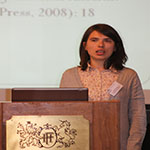Euroacademia Conferences
 Europe Inside-Out: Europe and Europeanness Exposed to Plural Observers (9th Edition) April 24 - 25, 2020
Europe Inside-Out: Europe and Europeanness Exposed to Plural Observers (9th Edition) April 24 - 25, 2020 Identities and Identifications: Politicized Uses of Collective Identities (9th Edition) June 12 - 13, 2020
Identities and Identifications: Politicized Uses of Collective Identities (9th Edition) June 12 - 13, 2020 8th Forum of Critical Studies: Asking Big Questions Again January 24 - 25, 2020
8th Forum of Critical Studies: Asking Big Questions Again January 24 - 25, 2020 Re-Inventing Eastern Europe (7th Edition) December 13 - 14, 2019
Re-Inventing Eastern Europe (7th Edition) December 13 - 14, 2019 The European Union and the Politicization of Europe (8th Edition) October 25 - 26, 2019
The European Union and the Politicization of Europe (8th Edition) October 25 - 26, 2019 Identities and Identifications: Politicized Uses of Collective Identities (8th Edition) June 28 - 29, 2019
Identities and Identifications: Politicized Uses of Collective Identities (8th Edition) June 28 - 29, 2019 The European Union and the Politicization of Europe (7th Edition) January 25 - 26, 2019
The European Union and the Politicization of Europe (7th Edition) January 25 - 26, 2019 7th Forum of Critical Studies: Asking Big Questions Again November 23 - 24, 2018
7th Forum of Critical Studies: Asking Big Questions Again November 23 - 24, 2018 Europe Inside-Out: Europe and Europeanness Exposed to Plural Observers (8th Edition) September 28 - 30, 2018
Europe Inside-Out: Europe and Europeanness Exposed to Plural Observers (8th Edition) September 28 - 30, 2018 Identities and Identifications: Politicized Uses of Collective Identities (7th Edition) June 14 - 15, 2018
Identities and Identifications: Politicized Uses of Collective Identities (7th Edition) June 14 - 15, 2018
A Very Reserved Westernism: Ukrainian National Project in Late Russian Empire
-
-

-
Presentation speakers
- Olha Martynyuk, National Technical University of Ukraine “Kiev Politechnic Institute” and Institut für die Wissenschaftenvom Menschen, Austria
- Download presentation
Abstract:
At the beginning of XX century, the Ukrainian national activists, who at that time enlarged the scopes of their activities to mass agitation through press, regarded themselves and Ukrainian nation as Western in comparison to Eastern Russia. In private correspondence they often described Russia as Asiatic uncivilized terrain, they despised political institutions of Russian Empire as incapable of effective political representation. Yet, in their public performance Ukrainian nationalists never dared to voice their vision of Russia overtly, and instead picked up particularly indirect and metaphoric ways of talking about West-oriented nature of Ukrainian nationalism. Firstly, because they acted within the formal rules of Russian Empire, hence they risked being censored and fined for expressing disrespect towards Russia and Russian Empire. Secondly, they targeted population which identified itself as Little Russians, Orthodox believers and subjects of Russian Empire. Because the same group of population was a targeted by Russian nationalists, overtly Western appeals might have had little success in forming Ukrainian identities.
Mild Southern Ukrainian climate as opposed to harsh Russian winters, soft Ukrainian character as opposed to rough insensitive psycho type of Russians, Ukrainian passionateness and love for freedom as contrasted to severity and unreflective commonality of Russians, individualism of Ukrainian village as opposed to Russian obshchina, – all of these ideas were widely used to justify Ukrainian West-oriented democratism and liberalism against Russian authoritarianism.
The proximity of Ukrainian and Russian national projects, as well as convoluted relations between them show a particularly interesting case of East/West discourse analysis. The meanings and images produced by national activists can also be viewed in terms of gender –particular metaphors have implicit gender message and thus accentuate“strengths” of Ukrainian national agenda and “weaknesses” of supposed Russian national agenda.
-
Related Presentations


















